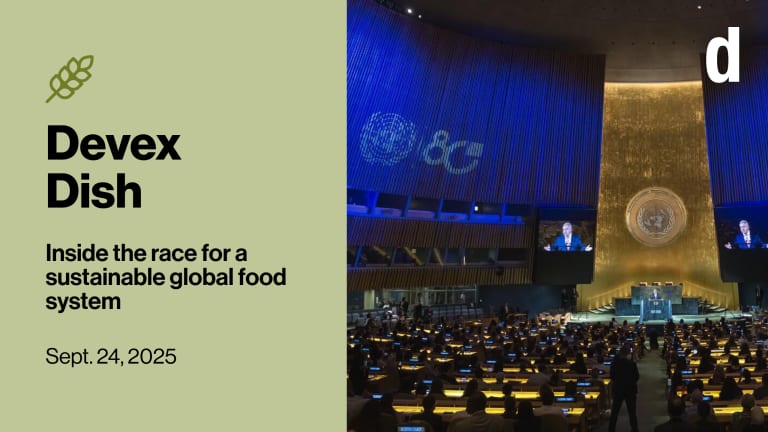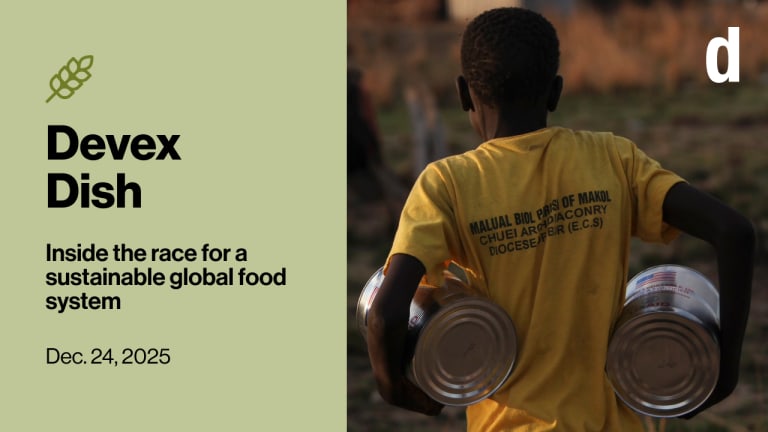
United States President Donald Trump is officially back for a second act, and he’s wasted no time shaking up the U.S. foreign policy and aid landscapes.
On Day 1, he ordered the U.S. to withdraw from the Paris Climate Agreement and World Health Organization, as well as a 90-day pause in all foreign development assistance pending a review of each program — after which they could be left alone, modified, or cut altogether. “The United States foreign aid industry and bureaucracy are not aligned with American interests and in many cases antithetical to American values,” his executive order on foreign aid begins. The U.S. aid community is scrambling to meet lawyers to see which funding is affected, as my colleague Michael Igoe reports.
It’s all got some food and nutrition advocates quaking in their boots. The U.S. is not only the world’s largest bilateral foreign aid donor — it spent $64.7 billion last year — it also gives the most food aid, by far. And while global food security and nutrition have long enjoyed bipartisan support, Republicans have a majority in both the House and Senate in the newly assembled Congress — and they’re decidedly more aligned with Trump’s “America First” agenda. That’s a gift to Trump, who will need their support to carry out everything that he wants to do.
Here are a few things we’re watching:
• Food fight: USAID’s Bureau for Resilience, Environment, and Food Security, or REFS, could face political and funding challenges under Trump, given its approach that closely links food security to climate change, which Trump is publicly skeptical of. REFS runs Feed the Future, the biggest U.S. global hunger and food security initiative, with an annual budget topping $1 billion. “There’s concern that this could be a lightning rod from an appropriations perspective,” a senior leader at a U.S.-based international NGO that works on nutrition told me, referring to the U.S. federal budgeting system. “Will we have to de-climatize food and agriculture policy?” they added, speaking on condition of anonymity. Dina Esposito, the former head at REFS, was a Biden political appointee and climate adaptation champion whose appointment concluded with the change in administration. We’ll be watching to see who will replace her. And of course, the yet-to-be-announced USAID chief will set the tone for the whole agency. Here’s what we know about USAID appointments so far.
• Reframe, baby, reframe: For REFS — and other U.S. government programs that link food security and hunger to climate change — surviving the second Trump administration might come down to reframing their work. “At the end of the day, it’s about messaging and how we talk about these issues,” Katie Lee, vice president of government affairs at the Washington-based Farm Journal Foundation, tells me. “Climate-focused work could be deprioritized by this administration. But in the previous Trump administration, a lot of work in agriculture had a positive impact on climate issues, but the real purpose of that work was to give smallholder farmers the tools to feed themselves and their families.”
• Trade-in: Trump has selected Luke Lindberg as the U.S. Department of Agriculture’s undersecretary of agriculture for trade and foreign agricultural affairs, which oversees USDA’s involvement in Feed the Future and other international food aid programs. The position requires Senate confirmation. Lindberg — who is the son-in-law of U.S. Senate Majority Leader John Thune, a Republican from South Dakota — is a senior fellow at the America First Institute as well as the president and CEO of public-private partnership South Dakota Trade, and he previously served as chief of staff at the Export-Import Bank of the United States. “Luke will work to make sure American Farmers and Ranchers get the smart Trade Deals that they deserve,” Trump said in a post on his social media site Truth Social last week.
• UNcertain times: It was widely expected that Trump would set his sights on the United Nations, and WHO was his first target. “If the U.S. exits WHO, our ability to influence global nutrition policy will be hurt,” the same NGO leader, speaking anonymously, told me last week. Less clear is what the new administration means for the World Food Programme, whose executive director Cindy McCain (in)famously does not get along with Trump. WFP, which counts on the U.S. as its biggest donor, faces a massive budget shortfall as hunger crises soar worldwide. McCain has never been able to raise as much money as her predecessor David Beasley, a fellow Republican whom Trump had nominated for the job.
There is some hope amid the uncertainty: During her Senate confirmation hearing Tuesday, Trump’s pick as U.S. ambassador to the U.N., Elise Stefanik, voiced strong support for WFP and UNICEF, which runs nutrition programs in 130 countries. She stressed they are the kinds of U.N. agencies that advance U.S. national security interests and should continue to be backed by Americans, my colleague Colum Lynch reports.
• Growing pains: There’s a major event for which the U.S. has not yet made a pledge: the Nutrition for Growth summit, set for March 27-28 in Paris, France. The last time it took place in 2021, the U.S. pledged $11 billion, and it’s unclear whether a big commitment will come under Trump.
As the Trump administration gets underway, we’re keeping an eye on progress on the U.S. Farm Bill, which governs U.S. food aid programs abroad; how Trump’s trade wars could affect global food prices and agriculture; and how Robert F. Kennedy Jr.’s leadership of the Department of Health and Human Services might influence U.S. nutrition policy at home and abroad. Did we miss anything? Let us know by emailing dish@devex.com.
+ Join us today at 12:30 p.m. ET (6:30 p.m. CET) for an exclusive discussion on what to expect in the first 100 days of Trump’s presidency — from foreign aid to multilateral relations. If you can’t attend live, register anyway and we’ll send you a recording.
This event is exclusively for Devex Pro members. Not yet gone Pro? Start your 15-day free trial today and enjoy these perks and more. Check out all the exclusive content available to you.
The full menu
All this Trump news is a lot to track, so we’ve got you covered. Below is the best reporting from Devex’s newsroom, offering insights to global development professionals, whether you work in nutrition programs, emergency humanitarian food aid, or any other role.
• Trump’s foreign assistance freeze generates uncertainty and confusion.
• Trump’s UN pick pinpoints agencies to support — and walk away from.
• The year of UNcertainty: The U.N. prepares for deep funding cuts under Trump.
• What will the presidential transition mean for U.S. aid implementers? (Pro)
• Trump orders US exit from WHO. Can it survive the financial hit?
• Marco Rubio sails through nomination hearing for U.S. secretary of state.
• Trump won. What does that mean for development?
And join us today at 12:30 p.m. ET (6:30 p.m. CET) for an exclusive discussion on what to expect in the first 100 days of Trump’s presidency — from foreign aid to multilateral relations.
Don’t miss the opportunity to hear from and ask questions to:
• Porter DeLaney, founding partner at Kyle House Group.
• David Berteau, president and CEO at Professional Services Council.
• Jennifer Kates, senior vice president and director of the Global Health & HIV Policy Program at KFF.
Register now to be part of this critical conversation. If you can’t attend live, register and send in your questions anyway, and we’ll send you a recording!
+ The event and the U.S. aid implementers article are some of the exclusive benefits you get as a Devex Pro member. Not yet gone Pro? Start your 15-day free trial today and enjoy these perks and more. Check out all the exclusive content available to you.
A cultural feast
Despite the slew of U.S.-related news this week, elsewhere the show must go on. Just over a year after its launch, the Food Culture Alliance is using food culture as a tool to tackle the global food crisis and push back against the private sector’s role in shaping unhealthy eating habits. And those habits are worsening as the global south begins emulating a Western diet, leading to a rise in health issues such as diabetes and heart disease.
But what people eat, how they eat, and the cultural narratives around food shape consumption patterns — yet this connection is often overlooked, Devex contributing reporter Rebecca Root writes. Started by the Global Alliance for Improved Nutrition, the EAT Foundation, and the Global Business School Network, the Food Culture Alliance aims to explore how food culture can transform food systems in sustainable, healthy ways. With pilot programs in Kenya, India, and Indonesia, the initiative focuses on “levers of change” — shaping narratives, strengthening culinary systems, and addressing social identity. In practice, this could mean working with scriptwriters, musicians, or media to create stories that highlight sustainable food production, cooking, and local traditions.
The approach mirrors successful public health campaigns that changed cultural norms, such as reducing smoking or promoting HIV testing through storytelling. Advocates believe similar tools could shift diets and improve planetary health.
While critics warn against a top-down approach, the alliance emphasizes collaboration with local partners, ensuring solutions are rooted in communities. “We provide the tools, but local folks decide how to use them,” says Dr. Eva Monterrosa, a co-founder of the alliance.
Read: New alliance centers culture as a weapon in the global food crisis
Chew on this
China is scouring the globe in search of new food supplies as it prepares for trade wars and Trump’s return. [Bloomberg]
In Europe, small-scale shellfish farmers face ruinous losses amid rising water temperatures. But they claim an EU fund meant to help them favors the powerful fishing industry. [The Guardian]
WFP is rapidly scaling up food aid in Gaza after the ceasefire with Israel took effect Sunday. [WFP]
Andrew Green contributed to this edition of Devex Dish.








